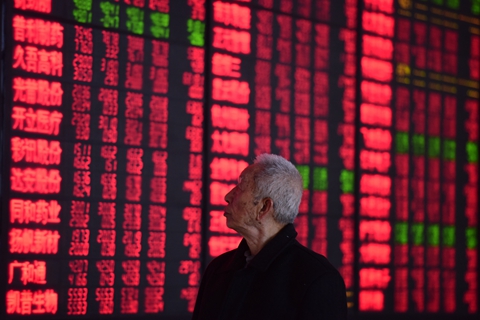Listed Brokerages Get New Lift From Stocks

China’s listed securities firms saw their main profit source shift from commission fees to stock market investments last year, as tightening financial supervision squeezed their revenues from asset management, investment banking and brokerage services.
Financial reports of China’s 37 publicly traded securities firms indicated across-the-board decline in their commission fee revenues last year. But returns from securities investments soared, thanks to the stock market’s bull run, they reported.
As of Thursday, the 37 listed brokerages had made heavy investments in 209 stocks. The mostly held stock is the Shanghai-listed Bank of China, followed by Huadian Power International Corp.
CITIC Securities Co., the country’s largest brokerage, saw its investment returns exceeding 13.3 billion yuan ($2.12 billion) in 2017, or 30.8% of its total revenue. The share of its revenue from brokerage business slid to 18.6%, or 8 billion yuan. Robust growth of investment returns boosted the company’s 2017 profit to 11.4 billion yuan, rising 10.3% from the previous year. In 2016, Citic Securities posted a 5.5 billion yuan loss in securities investment.
By the end of 2017, Citic Securities held 25 stocks, with a total market value of 3 billion yuan.
Another leading brokerage house, Huatai Securities Co., said its investment returns surged 93.4% in 2017 to 8.6 billion yuan. Huatai Securities reported 47.9% rise in net profit last year.
By the end of 2017, Huatai Securities held 4.09 billion yuan worth of shares, including 865 million worth shares of Bank of China.
According to companies’ financial reports, Citic Securities, Haitong Securities and Guotai Junan Securities are the top players among all listed brokerages in term of both revenue and profit.
Despite the upbeat performance of leading players, China’s securities industry as a whole witnessed sliding profit in 2017, as commission fees declined and market supervision tightened.
The total revenues of the 131 Chinese brokerages in the industry report slid by 5.1% to 311.3 billion yuan in 2017, compared with the year before, while net profits decreased by 8.5% to 113 billion yuan, industrial self-regulatory body the Securities Association of China said in February.
Brokerages’ profits generated from securities investments surged by 51.5% to 86.1 billion yuan, thanks to bullish market performance.
The Shanghai Composite Index, the country’s benchmark gauge, began 2017 with a 6.6% gain through the end of December, and later extended the bull run in January with a 25-month high. The CSI 300 index, a gauge that tracks 300 heavily weighed stocks in Shanghai and Shenzhen, surged 217.8% last year.
Contact reporter Han Wei (weihan@caixin.com)

- 1China Officials Dismiss Tax Hike Rumors After Tech Selloff
- 2Cover Story: How Gutter Oil Became a Prized Fuel for International Airlines
- 3Prominent Chinese Journalist Liu Hu Detained by Police in Chengdu
- 4Maersk Unit Takes Over CK Hutchison Panama Ports After Court Ruling
- 5China Provinces Set Cautious 2026 Growth Targets
- 1Power To The People: Pintec Serves A Booming Consumer Class
- 2Largest hotel group in Europe accepts UnionPay
- 3UnionPay mobile QuickPass debuts in Hong Kong
- 4UnionPay International launches premium catering privilege U Dining Collection
- 5UnionPay International’s U Plan has covered over 1600 stores overseas






